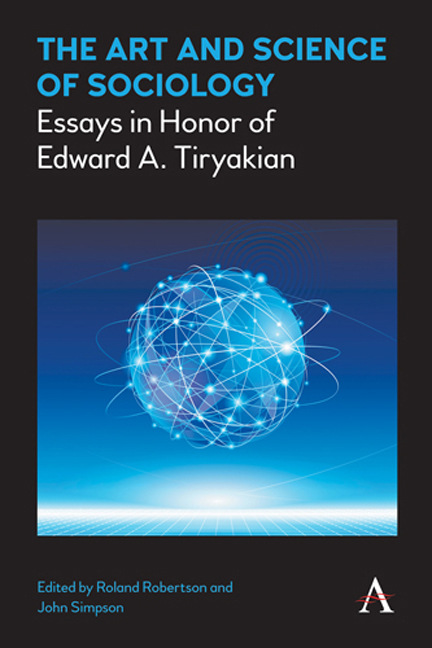Book contents
- Frontmatter
- Contents
- List of Figures and Tables
- List of Contributors
- Acknowledgments
- Introduction
- Chapter 1 The Dynamo and the Diplomat: Tiryakian's Role in Preserving Sorokin's Reputation
- Chapter 2 Edward Tiryakian and Modernization Theory: A Very Special Relationship
- Chapter 3 Developmental Path (Entwicklungsform): A Neglected Weberian Concept and Its Usefulness in the Civilizational Analysis of Islam
- Chapter 4 The Existential Sociology of Edward Tiryakian: Toward an Integrated Paradigm
- Chapter 5 Comparative Reflections on Sociology and Conservatism: The Contributions of Edward A. Tiryakian
- Chapter 6 Contemporary Changes in the Processes of Social Differentiation: Toward an Analytical Version of the Theory
- Chapter 7 Considerations on Global Studies
- Chapter 8 Honoring Edward Tiryakian as a Metasociologist: A Metaconceptual Analysis of Prosumption and Related Concepts
- Chapter 9 Dangerous Nouns of Process: Differentiation, Rationalization, Modernization
- Chapter 10 Modernization as Social Becoming: Ten Theses on Modernization
- Chapter 11 Religion and Evolution
- Chapter 12 The “Axial Age” vs. Weber's Comparative Sociology of the World Religions
- Edward A. Tiryakian's Publications
- Index
Chapter 10 - Modernization as Social Becoming: Ten Theses on Modernization
Published online by Cambridge University Press: 22 July 2017
- Frontmatter
- Contents
- List of Figures and Tables
- List of Contributors
- Acknowledgments
- Introduction
- Chapter 1 The Dynamo and the Diplomat: Tiryakian's Role in Preserving Sorokin's Reputation
- Chapter 2 Edward Tiryakian and Modernization Theory: A Very Special Relationship
- Chapter 3 Developmental Path (Entwicklungsform): A Neglected Weberian Concept and Its Usefulness in the Civilizational Analysis of Islam
- Chapter 4 The Existential Sociology of Edward Tiryakian: Toward an Integrated Paradigm
- Chapter 5 Comparative Reflections on Sociology and Conservatism: The Contributions of Edward A. Tiryakian
- Chapter 6 Contemporary Changes in the Processes of Social Differentiation: Toward an Analytical Version of the Theory
- Chapter 7 Considerations on Global Studies
- Chapter 8 Honoring Edward Tiryakian as a Metasociologist: A Metaconceptual Analysis of Prosumption and Related Concepts
- Chapter 9 Dangerous Nouns of Process: Differentiation, Rationalization, Modernization
- Chapter 10 Modernization as Social Becoming: Ten Theses on Modernization
- Chapter 11 Religion and Evolution
- Chapter 12 The “Axial Age” vs. Weber's Comparative Sociology of the World Religions
- Edward A. Tiryakian's Publications
- Index
Summary
Modernization, as a crucial type of macrosocial change, is an ambiguous and contested concept. Like the idea of social change itself, modernization is treated in two opposite ways in sociological theory. One characteristic of evolutionism, or developmentalism, dominant in classical nineteenth-century social thought, puts emphasis on its inevitable unilinear course and single final destination. Another characteristic—emerging from the critique of determinism, fatalism and finalism—assumes contingency, multilinearity and openendedness of modernization. It looks at modernization as a possibility rather than a necessity, as an achievement rather than a fate, and claims that whether this possibility is achieved depends on the actions, decisions and choices of the members of society plus the conducive circumstances for mobilizing and facilitating such actions. The contingent character of these actions and circumstances produces various trajectories and outcomes of modernization, in other words multiple modernities.
I take the latter perspective and in this chapter will attempt to apply to the analysis of modernization my general theory of social becoming as put forward in two books in the 1990s: one, a monograph by Polity Press, Cambridge (Sztompka 1991), and another a textbook of the sociology of social change by Blackwell, Oxford (Sztompka 1993). This very general model of social becoming has a number of implications that have been hinted at or formulated here and there in the rich literature on modernization. I propose to put these implications together in a synthetic picture by means of ten theses on modernization. Each could be elaborated separately, but here I will present a list, a sort of agenda for future research.
• Thesis 1. Modernization is the particular implementation of social becoming. Therefore, the inspiration for the theory of modernization can be found in one of the most important sentences in the history of sociology: “Men make their own history, but they do not make it as they please, only in circumstances given to them, encountered and inherited from the past generations” (Marx 1964, 1968). Applied to modernization, “making history” means that the process results from the transforming potential of human agency, understood as a synthetic force ascribed to a society as a whole.
- Type
- Chapter
- Information
- The Art and Science of SociologyEssays in Honor of Edward A. Tiryakian, pp. 163 - 172Publisher: Anthem PressPrint publication year: 2016



